The Getting There Together Coalition, a group of 50+ member organizations that was formed in 2017 to influence the Metro transportation investment package that will be sent to voters in 2020, says the recommendation by Metro staff on how to spend the first $3.1 billion in new revenue is too timid.
“If the Task Force and Metro Council really wants to see transformational impacts through this measure (to be clear: we do), the Coalition recommends turning T2020 into a transformative first step in addressing our region’s transportation needs by doubling down on the corridors where the needs are greatest, and removing from consideration projects where the needs and impact do not match the values above,” wrote the Coalition’s lead organizer Walter Robinson II in a copy of written testimony to be submitted to the Transportation Funding Task Force for their meeting Wednesday night.
Advertisement

The Getting There Together Coalition — which includes The Street Trust, Oregon Walks, Community Cycling Center, 1000 Friends of Oregon, Oregon Environmental Council, OPAL Environmental Justice Oregon, and others — wants Metro to “double down” and fully fund identified needs on certain corridors while removing several new roads and road widening projects from consideration. They are requesting full funding for projects on Tualatin Valley Highway, McLoughlin Blvd, and Portland Central City while asking the Metro Task Force to remove a connector road proposed in the Columbia to Clackamas (C2C) project and an extension of NE Airport Way proposed in the 82nd Ave project.
It’s clear that this coalition will not support any projects that add new roadways or new driving lanes that would increase automobile capacity. That stance puts them at odds with other stakeholders who feel that economic development and population growth give Metro an obligation to fund new roads like the Sunrise Corridor. That political reality did not escape former PBOT Director Leah Treat, who said at a panel discussion in 2017 that, “There’s a need to address through-put. Unless we satisfy people outside of Portland on that, a package won’t be successful.”
Climate change activism group 350 PDX called Metro’s recommended project list “dismal” in an email to supporters today. They are urging people to wear read at tonight’s Task Force meeting to send the message that, “we need a green new deal for transportation, not billions of dollars for fossil fuel car infrastructure.”
This debate will heat up tonight at Metro headquarters as the Transportation Funding Task Force meets with an intent of putting together a final package of projects to forward to Metro Council.
— Jonathan Maus: (503) 706-8804, @jonathan_maus on Twitter and jonathan@bikeportland.org
— Get our headlines delivered to your inbox.
— Support this independent community media outlet with a one-time contribution or monthly subscription.

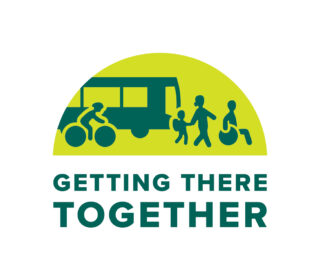
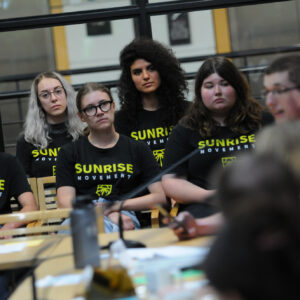
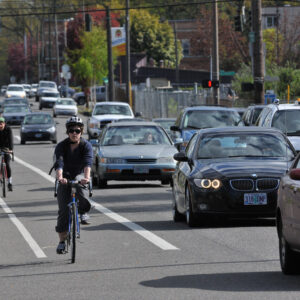
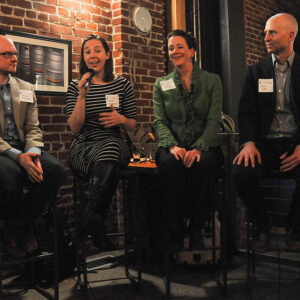
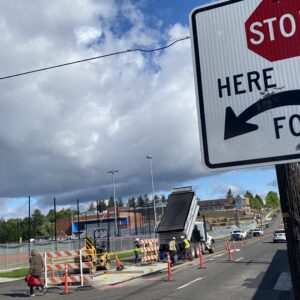
“It’s clear that this coalition will not support any projects that add new roadways or new driving lanes that would increase automobile capacity.”
Hear, hear.
“…other stakeholders who feel that economic development and population growth give Metro and obligation to build new roads…”
This is a perfect encapsulation of the pervasive myopia, wishfulness, confusion we (almost) all suffer from. The fossil fuel era is finished; it is in the process of finishing us. More, additional roads are the last thing we need, can afford. Population growth and economic development should not (no longer) be understood as drivers of policy priorities. Like roads they are things we can no longer afford, should find ways to problemstize and discourage.
A possible Plan B: Use all the good ideas and coalition building that has been brewing in the Getting Together Coalition and enlist the more forward-thinking members of the T2020 Task Force to launch an insurgent initiative petition for a “People’s T2020 Funding Package.”
What projects do you think “the people” would choose?
Maybe better to call it T2020 For The Future or something.
Transformative Transit Transportation TTT2020
To build on what Jim is saying and Terenig Topjian City Lab article on Monday, we need to come up with a $3.1 billion grocery list of transformative Metro-wide bike, ped, and transit projects that serve all users, all districts, and all three (or four) counties as an alternative narrative.
Think big.
I’m all for an alternative list of projects, but *not* $3.1 billion. That is accepting Metro’s erroneous narrative that even though Seattle voters approved $80+ billion over 2 ballot measures and car- centric LA voters approved $100+ billion, somehow Portland can’t possibly hope for anything remotely near that… That we’re doomed to accept crumbs. What did those cities have in common? Political will, and a coalition that *educated and persuaded voters* to understand that only full-bore, massive, 100% transit/ bike/ped funding package would meaningfully address congestion. Oh, and by the way, make a dent in carbon emissions.
The other thing that happened in Seattle is that way back in the 1990s, when politicians first tried a transportation funding measure that (like T2020) was 50-50 cars & transit, the environmental community mobilized successfully to defeat that bad ballot measure. What cane out of that? Sound Transit 1, 2, and 3… the massive, transit/ bike/ ped-ONLY measures that are utterly revolutionizing transportation in the whole Puget Sound Region. Why can’t Portland have that too? The only thing standing in the way is the tyranny of small thinking and low expectations.